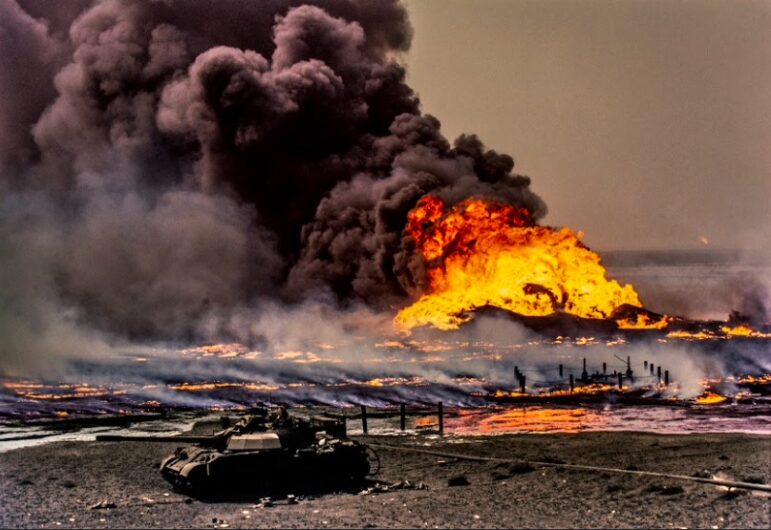As war ravages countries in various areas of the world, it is easy to ignore when it doesn’t occur in one’s backyard, yet, the deaths of those in war-torn countries can have impacts worldwide - more than one might think. Countries directly impacted by war are put through destruction of buildings, the deaths of many plants and trees (along with people), and the release of harmful weapons, all of which hurt the environment and pollute the air. As the Conflict and Environmental Observatory notes, a 2022 study specifies 5.5% of carbon emissions in the world are produced by war and military activities, a likely underestimate, the question arises whether when fighting one another, countries doom the entire world.
Military
For starters, training, fueling and providing weapons to militaries involves a large amount of resource consumption and emissions of greenhouse gasses; so much so that the United States military is the single largest institutional consumer of petroleum in the world, according to Brown University, and the U.S. Department of Defense in fiscal year 2021 reported its emissions at close to the same amount as Sweden.U.K.’s military has 3.3 million metric tons for fiscal year 2021-2022, and the carbon emissions for many other developed countries across the world are likely high as well. Maintaining militaries requires effort, yet, unfortunately, a significant part of this burden falls on the environment.
War zones
Furthermore, the war zones like the war in Ukraine have taken a severe toll on not just the people, but also the environment, with writer Joe McCarthy detailing that the war “extensively harmed Ukraine’s natural environment.” While destruction is almost always the aftermath of all wars, the destruction of the environment is often overlooked, with modern warfare exponentially increasing the impact on the environment. With the introduction of newer warfare involving complex bullets, bombs and nuclear weapons, war is becoming more and more dangerous to the world. Philip Swintek of Fordham University furthers this notion, writing that “Nuclear Bombs dropped on Hiroshima and Nagasaki are the two singlemost destructive events in human history,” as it polluted the air, heightened the temperature, and polluted the water. While some environmental effects of the nuclear weapon still linger today, the impact of such weapons and warfare is unquestionable, and its impact on the environment-frightening. And as “from 1950 to 2000, more than 80 percent of the world’s major armed conflicts took place in biodiversity hotspots, areas that are rich in native species but under threat, Dr. Hanson and his colleagues found this in a 2009 study.” (New York Times)
From soldiers looting oil and timber to support their war efforts, and cutting down trees to see the enemy better in a forest area, the environment is sometimes specifically targeted in order to further the interests of the military. Plus, because food insecurity remains a leading cause of war, many living in war-torn regions are forced to rely on wild animals for food, causing a decline in the animal population. Almost every element of war causes death, destruction and environmental degradation, revealing how even though most people don’t feel impacted by war, it should be a major concern for many. A military’s purpose is to protect the people of a nation, but in doing so, it may be inadvertently affecting the people it serves to protect.
New military technology
Still, countries such as the United States are currently implementing programs in order to improve sustainability in defense technology. Known as STED’s the Department of Defense is currently testing shooting programs with a bio-based cleaner, energy efficient doors of buildings, LED lights instead of chemiluminescent ones, and PFAs free food service ware. In addition all of these programs have shown some level of success, and if implemented across the U.S. Department of Defense, could significantly aid the environment.
Conclusion
However, are sustainable technologies even ethical? Are they actually encouraging wars over the pretense that it doesn’t hurt the environment? Doesn’t it cost money to manufacture green bullets? Can we ever truly end the environmental impact of warzone fighting? No one really knows, and only a limited number of individuals in the world have the power to control the wars that impact all of us. Yet, by acting responsibly, through methods such as recycling and buying environmentally friendly products, everyone can take small steps to compensate for the environmental impact of war zones. That way, as bloodshed occurs in wars, not everyone’s blood has to be shed through climate change.
Our Statement
Throughout this article, GreenWaySquad discusses the environmental impacts of war, but at no point of time are we defaming the militaries mentioned or arguing for a side in a war. GreenWaySquad is an unbiased youth organization that promotes sustainability and recycling education, and we do not side with political candidates, states, or countries. If you found our content biased in any way, please contact us through our website and help us understand and fix the issue.

